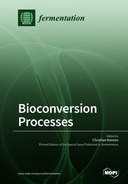Explore

Compared to conventional chemical technologies and other similar industrial processes, bioprocesses represent a more sustainable and environmentally-friendly alternative for the production of fuels and platform chemicals. In biorefineries, different kinds of feedstocks, such as biomass or lignocellulosic materials in general, can be used and fermented by microorganisms (e.g., bacteria, fungi, algae), after some pretreatment steps, to produce high added-value metabolites. More recently, wastes, wastewaters and also waste gases have been shown to be suitable for resource recovery or for their bioconversion to (bio)fuels (e.g., ethanol, butanol, hexanol, biodiesel, biohydrogen, biogas) or other commercial products (e.g., biopolymers). In this sense, much effort has also been made to bioconvert greenhouse gases, such as CO2, into useful products.The goal of this Special Issue is to publish both recent innovative research data, as well as review papers on the fermentation of different types of substrates to commercial (bio)fuels and (bio)products, mainly focusing on the bioconversion of pollutants in solid, liquid, or gas phases (wastes, wastewaters, waste gases).
This book is included in DOAB.
Why read this book? Have your say.
You must be logged in to comment.
Editions


